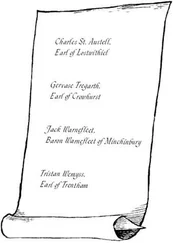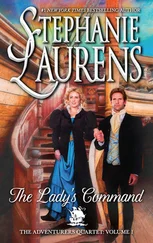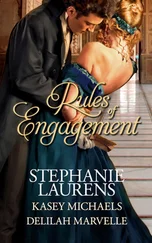She didn’t re-emerge onto the deck until the morning was well advanced. On waking late, she’d been unsurprised to find herself alone in the stern cabins; she’d breakfasted in solitary state while sampling some of the other volumes in the bookcase—some earlier, some later.
Most of Royd’s missions—for the voyages detailed in the journals were transparently that—had been short, only a month or two. A few had stretched for nearly a year. Some had occurred during the late wars, while others had been more recent—after she’d ended their handfasting.
Of those later missions, certain of the details he’d jotted down in nonchalant vein would have induced panic if she hadn’t known he was still hale and whole. He’d always harbored a certain disregard for danger—a trait she in large part shared—yet some of his actions in those later missions seemed ridiculously risky, even for him.
Via the logs filling the third shelf of the bookcase, she’d confirmed that, in between missions, he’d sailed on Frobisher company business, ferrying personages of wealth and influence—often royalty—across various seas. Those were the voyages she and others in Aberdeen, and no doubt elsewhere, knew of and associated with Royd Frobisher.
The missions were something else entirely.
She’d led a relatively sheltered existence, yet even with her limited knowledge, she could imagine just how dangerous some of the undertakings he’d been involved in must have been.
Last night, he’d intimated that this voyage was a mission similar to the one that had disrupted their handfasting.
Even more than a need for fresh air, curiosity sent her up on deck. She took several of his journals and logs with her. One glance confirmed that he was at the wheel, and that Duncan stood by his side, the wind whipping his hair about his eager face. She returned her son’s wave—and returned Royd’s sharp look with a noncommittal nod—then headed for the bow.
A triangular bench filled the bow’s tip; the spare anchor was stored beneath it. She climbed up, wedged her shoulders between the gunwales, and settled to read; the more she learned about the man she’d thought she’d known but evidently hadn’t, the better.
Eventually, Bellamy came forward to speak with her. “If you’re ready for luncheon, miss, I’ll summon the captain and the young master.”
“Thank you.” Isobel allowed the old sea dog to gallantly assist her off the bench, then she gathered the journals and logs. “I’ll go down directly.”
Young master. She wondered whether Royd had made any announcement regarding Duncan. Then again, he wouldn’t have had to say a word for his crew to know exactly whose son Duncan was; just seeing father and son together was declaration enough.
Bellamy accompanied her to the aft hatch. While he went on to the upper deck, she went down the stairs and back to the main cabin. She returned the journals and logs to the bookcase; she was closing the doors when she heard Duncan’s feet pattering down the stairs, then thundering along the corridor.
She turned in time to catch him as he hurled himself against her.
“Mama!” He flung his arms around her waist, tipped his head back, and smiled delightedly up at her. “We saw seals—big ones! And lots of gulls.”
She couldn’t resist that smile. She ruffled his hair. “And have you been asking lots of questions?” She knew her son.
“Endless questions.” Royd followed Duncan in; his tone was long-suffering, but his face was alight—as alight as Duncan’s.
The large desk was their table; Isobel sat at one end while Duncan took the place at the front of the desk, facing Royd, who settled in his accustomed chair.
While she smiled at Bellamy and complimented him on the finely sliced corned beef he set before them, she wondered what tack Royd’s calculating mind was taking with respect to Duncan. And herself. In the instant Royd had set eyes on Duncan, their lives—Duncan’s, hers, and Royd’s—had irreversibly changed.
What she didn’t yet know was where that change had landed them. While she would have infinitely preferred to control everything to do with Duncan, now Royd knew of his existence, there was no point imagining she could sit back and hope that Royd would grow bored with the demands of parenthood and lose interest in his son.
She’d told him she would never let anyone take Duncan from her, but from what she’d seen of their interactions, of Royd’s protectiveness and the patience he displayed in dealing with Duncan’s incessant questions, Royd releasing Duncan to her sole care was not going to happen, either.
They—she and Royd, and Duncan, too—were going to have to find common ground, but exactly what such ground might look like, at this stage, she couldn’t begin to guess.
Duncan didn’t speak but applied himself assiduously to taking the edge from his ever-present hunger. Royd watched his son, studying Duncan while he, too, ate. Isobel watched them both, curious as to how they were getting on—curious to see how Royd managed. She’d definitely thrown him into deep water in terms of dealing with a son.
Then again, in all contexts, Royd was an excellent swimmer.
With the worst of his hunger assuaged, Duncan looked at Royd and started asking about ropes and knots.
Royd answered easily.
Isobel kept her attention on her plate.
But eventually, Duncan looked at her. She felt his gaze, looked up, and, for once, couldn’t define the expression in his dark-brown eyes. Then he transferred his gaze to Royd. “You said you’re married to Mama. So what’s my name? My proper full name?”
Royd’s gaze swung her way.
She met it, but not knowing what he’d said to Duncan—and unable to dispute that, in a way, they were, indeed, married—she didn’t know what to say.
Royd looked at Duncan and met his gaze levelly. “What name have you been going by?”
“Duncan Carmody.”
Royd nodded as if having expected that; he probably had. “Your full name is Duncan Carmody Carmichael Frobisher.” He glanced at her and arched a brow.
When Duncan looked at her, she forced herself to nod. “Yes. That’s correct.” She met her son’s gaze. “That is your full name.”
Silently, Duncan repeated the four words, then grinned. “Good.”
He’d finished his meal; he set his cutlery down and reached for the apple Bellamy had left for him. Duncan crunched into the fruit, chewed, swallowed, then asked, “Can I go back on deck?”
She’d eaten enough. Royd had cleaned his plate and was sitting back in his chair, observing. A touch unnerved by the apparent domesticity, she pointed to the glass in front of Duncan. “Finish your milk, and then we’ll go up.”
Duncan seized the glass, drained it, then he grabbed his napkin and wiped off the resulting milky mustache. “I’m ready.”
She rose; so, too, did Royd. She followed Duncan from the cabin, and Royd followed her.
Once again, she retreated to the bench in the bow, and while watching Royd and Duncan, revisited the questions to which she still lacked answers.
Royd opted to leave the wheel in Liam Stewart’s care and spent the next half hour teaching Duncan a set of basic nautical knots. Eventually consigning Duncan to the tutelage of his bosun, Jolley, to learn more about where and when the different knots were used, Royd strolled to the bow.
On reaching Isobel, he met her dark gaze, then turned and sat by her feet. He rested his forearms on his thighs and clasped his hands. “Well?”
He was perfectly sure she had questions.
“The mission you were sent on after we handfasted. You originally expected it to last only for a month or so. Why did it take so long?”
He knew what he’d written in his journal. He’d reread it many times over the years, whenever the question of whether he could have done anything other than what he had—and thus not lost her—became too insistent and had to be, once again, put to rest. “The original mission was to infiltrate the court of the Dey of Algiers and confirm that he was capturing, holding, and eventually selling Europeans as slaves. In order to do that, I had to pose as a half-French emissary of an Arabic slave trader. I succeeded in getting access to the Dey’s slave pens—where I discovered over three thousand Europeans. That was a far larger number than anyone had imagined. Originally, I was supposed to simply learn the number and then get out and report to Exmouth, who was supposed to be at Gibraltar. But Exmouth came in early and stood off the port of Algiers, thinking to intimidate the Dey into releasing his European captives.”
Читать дальше

![Стефани Лоуренс - Капитан «Корсара» [Lord of the Privateers]](/books/26539/stefani-lourens-kapitan-korsara-lord-of-the-pri-thumb.webp)










